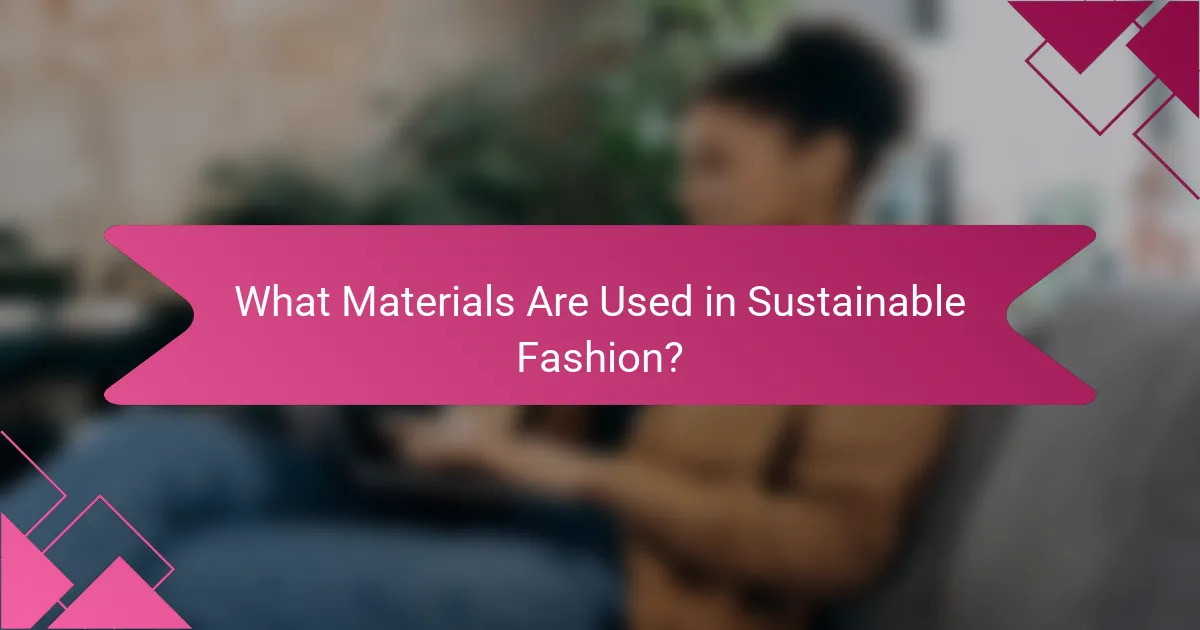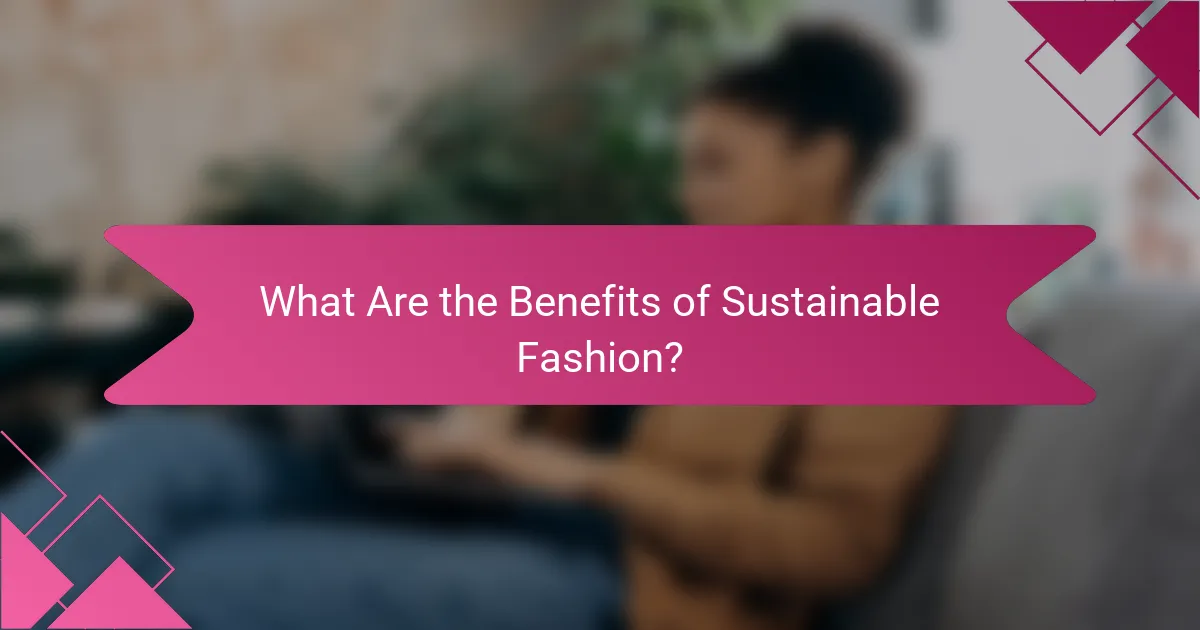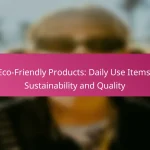Sustainable fashion brands in the US are leading the way in eco-conscious choices, ethical production, and stylish designs. By utilizing organic materials and promoting fair labor practices, these brands not only minimize their environmental impact but also ensure transparency and worker welfare throughout their supply chains.

What Are the Best Sustainable Fashion Brands in the US?
The best sustainable fashion brands in the US prioritize eco-conscious practices, ethical production, and stylish designs. These brands often use organic materials, promote fair labor practices, and focus on minimizing their environmental impact.
Patagonia
Patagonia is a leader in sustainable fashion, known for its commitment to environmental activism and high-quality outdoor apparel. The brand uses recycled materials and organic cotton, ensuring that its products have a reduced ecological footprint.
Additionally, Patagonia encourages customers to repair and recycle their gear, promoting a circular economy. Their Worn Wear program allows customers to trade in used items for store credit, further extending the life of their products.
Eileen Fisher
Eileen Fisher emphasizes simplicity and sustainability in women’s clothing, focusing on timeless styles made from organic and recycled materials. The brand is dedicated to ethical production, ensuring fair wages and safe working conditions for its workers.
Through its Renew program, Eileen Fisher takes back used garments to be refurbished and resold, reducing waste and encouraging a more sustainable approach to fashion consumption.
Reformation
Reformation combines trendy designs with sustainable practices, making it a popular choice among eco-conscious consumers. The brand tracks its environmental impact and uses sustainable fabrics, such as Tencel and recycled polyester, to create stylish clothing.
Reformation also prioritizes transparency, providing customers with information about the sustainability of each item, including water usage and carbon emissions during production.
Everlane
Everlane is known for its “Radical Transparency” philosophy, revealing the true costs behind each product and the factories where they are made. The brand focuses on ethical production and uses high-quality materials that are designed to last.
By offering a range of basics and essentials, Everlane encourages consumers to invest in timeless pieces rather than fast fashion, promoting a more sustainable wardrobe.
Outerknown
Outerknown, co-founded by surfer Kelly Slater, emphasizes sustainability in its surf and casual wear. The brand uses organic and recycled materials, and it is committed to fair labor practices throughout its supply chain.
Outerknown also focuses on transparency, sharing information about its production processes and the environmental impact of its products. This approach helps consumers make informed choices while supporting sustainable fashion.

How Do Sustainable Fashion Brands Ensure Ethical Production?
Sustainable fashion brands ensure ethical production by adhering to practices that promote fairness, transparency, and worker welfare. These brands focus on responsible sourcing, fair labor practices, and maintaining open communication throughout their supply chains.
Fair Trade Practices
Fair trade practices involve ensuring that producers receive fair compensation for their work, which helps to empower communities and improve living standards. Many sustainable brands partner with certified fair trade organizations that set standards for wages, working conditions, and environmental sustainability.
For example, brands may source materials from cooperatives that guarantee a minimum price for farmers, which can be significantly higher than conventional market rates. This approach not only supports ethical production but also fosters long-term relationships with suppliers.
Transparent Supply Chains
Transparent supply chains allow consumers to trace the origins of their clothing and understand the processes involved in production. Sustainable fashion brands often publish detailed information about their sourcing, manufacturing locations, and the practices employed at each stage.
To enhance transparency, some brands utilize technology such as blockchain to provide verifiable data about their supply chains. This openness helps consumers make informed choices and encourages brands to maintain ethical standards throughout their operations.
Worker Welfare Initiatives
Worker welfare initiatives focus on improving the conditions under which garments are produced. Sustainable fashion brands often implement programs that promote health, safety, and education for workers in their supply chains.
These initiatives may include providing access to healthcare, fair working hours, and training programs that enhance skills and career opportunities. By prioritizing worker welfare, brands not only comply with ethical standards but also contribute to the overall well-being of communities involved in fashion production.

What Materials Are Used in Sustainable Fashion?
Sustainable fashion primarily utilizes eco-friendly materials that minimize environmental impact and promote ethical production. Common materials include organic cotton, recycled polyester, and Tencel, each offering unique benefits and considerations for conscious consumers.
Organic Cotton
Organic cotton is grown without synthetic pesticides or fertilizers, making it a healthier choice for the environment and farmers. This method of cultivation promotes biodiversity and reduces soil degradation.
When selecting organic cotton products, look for certifications such as GOTS (Global Organic Textile Standard) to ensure compliance with environmental and social criteria. Organic cotton typically costs more than conventional cotton, but the benefits to sustainability can justify the price.
Recycled Polyester
Recycled polyester is made from post-consumer plastic waste, such as bottles, which helps reduce landfill waste and the demand for virgin materials. This material retains many of the properties of traditional polyester, including durability and moisture-wicking capabilities.
Brands often use recycled polyester in activewear and outerwear. When purchasing, check for certifications like the Global Recycled Standard (GRS) to ensure the product meets recycling and environmental criteria.
Tencel
Tencel, or lyocell, is derived from sustainably sourced wood pulp, primarily from eucalyptus trees. The production process uses a closed-loop system that recycles water and solvents, minimizing waste and environmental impact.
Tencel is known for its softness, breathability, and biodegradability, making it an excellent choice for garments that are both stylish and eco-friendly. Look for Tencel products labeled with the Oeko-Tex certification to ensure they are free from harmful substances.

How to Choose Eco-Conscious Fashion?
Choosing eco-conscious fashion involves selecting brands that prioritize sustainability and ethical production. Look for transparency in sourcing, manufacturing processes, and the materials used in their clothing.
Look for Certifications
Certifications can help identify brands committed to sustainable practices. Look for labels such as GOTS (Global Organic Textile Standard), OEKO-TEX, and Fair Trade, which indicate adherence to environmental and social standards.
These certifications often require brands to meet specific criteria regarding organic materials, safe working conditions, and minimal environmental impact. Checking for these labels can simplify your decision-making process.
Research Brand Practices
Investigating a brand’s practices is crucial for understanding its commitment to sustainability. Review their website and look for information on sourcing materials, labor practices, and environmental impact.
Brands that are genuinely eco-conscious will often share their sustainability goals and progress reports. Pay attention to their supply chain transparency and whether they engage in ethical labor practices.
Prioritize Quality Over Quantity
Investing in high-quality pieces rather than numerous low-quality items is a key principle of sustainable fashion. Quality garments tend to last longer, reducing the need for frequent replacements and minimizing waste.
When shopping, consider the durability of fabrics and construction. Look for timeless styles that won’t go out of fashion quickly, as these can be worn for years, further supporting sustainable choices.

What Are the Benefits of Sustainable Fashion?
Sustainable fashion offers numerous benefits, including reduced environmental impact, improved ethical standards in production, and enhanced consumer awareness. By choosing eco-conscious brands, consumers can contribute to a healthier planet and support fair labor practices.
Environmental Impact Reduction
Sustainable fashion significantly reduces environmental impact by minimizing waste, lowering carbon emissions, and conserving water. Brands often use organic materials, recycled fabrics, and eco-friendly dyes to lessen their ecological footprint.
For example, choosing clothing made from organic cotton can save up to 90% of the water typically used in conventional cotton farming. Additionally, many sustainable brands implement circular fashion practices, encouraging recycling and upcycling to extend the life cycle of garments.
To make eco-conscious choices, look for certifications such as Global Organic Textile Standard (GOTS) or OEKO-TEX, which ensure that products meet strict environmental and social criteria. Avoid fast fashion brands that prioritize profit over sustainability, as they often contribute to significant waste and pollution.


